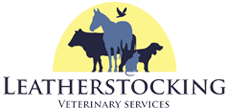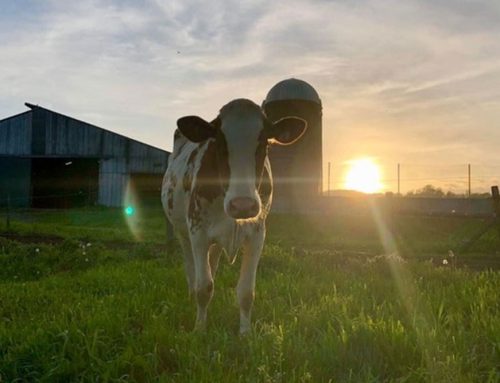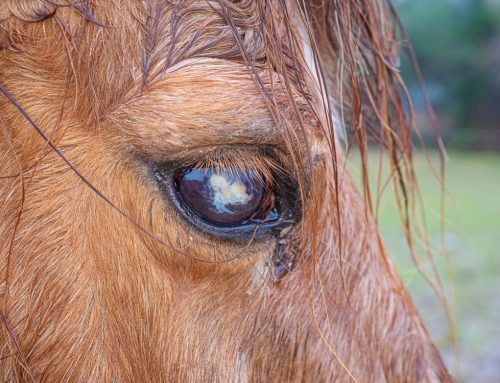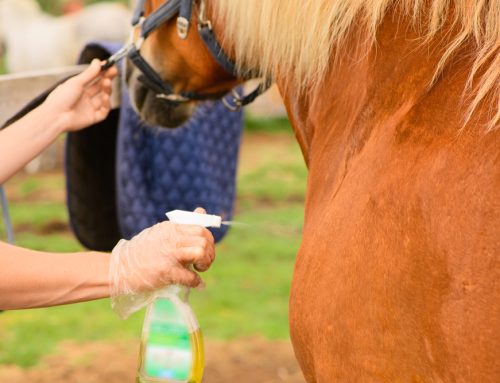Vaccines are administered to animals to stimulate the body to produce an immune response to a particular pathogen to help keep animals healthy and disease free. Most vaccines require repeated administration yearly or every few months to be effective. Our Leatherstocking Veterinary Services team wants to help by providing information about the vaccines that we recommend for horses, cattle, sheep, and goats to ensure your animals get the protection they need.
Horse vaccinations
The American Association of Equine Practitioners (AAEP) categorizes horse vaccines as core or risk-based. Core vaccines are those that all horses should receive every year, while risk-based vaccines depend on the horse’s location and lifestyle. Core vaccines include:
- Rabies — Rabies is a deadly virus transmitted through an infected animal’s bite. Wild animals, such as raccoons, foxes, bats, and skunks, can carry the disease. No rabies treatment is available, and most cases are fatal once signs occur.
- Tetanus — Tetanus is caused by Clostridium tetani, a toxin-producing bacteria found in soil and manure. The bacteria enter the body through wounds or foot injuries (e.g., when your horse steps on a nail), and the toxins cause muscle rigidity that can lead to an inability to swallow. As the paralysis spreads, your horse’s breathing may also be affected.
- West Nile virus (WNV) — WNV is a mosquito-borne virus that causes signs in horses ranging from mild, flu-like signs, to severe, potentially fatal brain inflammation.
- Eastern and Western equine encephalitis — These are mosquito-borne, viral diseases that cause brain inflammation and, although rare, have a high mortality rate in horses.
Risk-based vaccines for horses include:
- Equine influenza — Equine influenza is an airborne disease that causes fever and a clear nasal discharge.
- Strangles — Caused by Streptococcus equi, strangles is a highly contagious equine disease characterized by lymph node swelling and abscess formation, primarily in the head and neck.
- Equine herpesvirus (EHV) — EHV can cause upper respiratory disease, neurological disease, abortions, and neonatal death.
- Potomac horse fever (PHF) — PHF is caused by Neorickettsia risticii (i.e., an intracellular rickettsial organism) that infects the gastrointestinal tract lining and results in colitis and diarrhea.
Cattle vaccinations
Vaccination protocols for cattle herds should be individually tailored, because factors such as herd type, genetics, and health history must be considered. In November 2021, the American Association of Bovine Practitioners (AABP) published vaccination guidelines to help their members develop vaccination protocols for clients. This document lists the following core vaccines for cattle:
- Infectious bovine rhinotracheitis (IBR) — IBR is a contagious respiratory disease caused by bovine herpesvirus type 1. The virus causes massive upper respiratory inflammation and can also cause infertility, abortions, and birth defects.
- Bovine viral diarrhea (BVD) — BVD is a pestivirus that causes generalized immune suppression, leading to secondary infections from other viruses and bacteria. The virus can cause severe, bloody diarrhea, abortions, and birth defects.
- Parainfluenza 3 (PI3) — The PI3 infection attacks the upper respiratory mucosa. Secondary infections are common.
- Bovine respiratory syncytial virus (BRSV) — BRSV attacks the lower respiratory tract, and can cause viral pneumonia and, potentially, secondary bacterial pneumonia.
- 7-way clostridial — This vaccine protects against Clostridium chauvoei (i.e., blackleg), Clostridium septicum, Clostridium sordellii (i.e., malignant edema), Clostridium novyi (i.e., black disease), and three types of Clostridium perfringens (i.e., enterotoxemia). Blackleg occurs when grazing animals ingest bacterial spores, which travel to skeletal muscle where they germinate, multiply, and produce toxins that cause muscle necrosis and hemorrhage. Other clostridial infections also cause significant, sometimes life-threatening disease.
Risk-based vaccines for cattle include brucellosis, salmonellosis, K99 Escherichia coli, and Clostridium tetani.
Sheep and goat vaccines

Only one vaccine is characterized as a core vaccine for sheep and goats—a combination vaccine for the clostridial diseases. However, other vaccines may be beneficial for your sheep and goat herds, including:
- Clostridium perfringens C and D — Known as enterotoxemia or overeating disease, C. perfringens is characterized by acute indigestion, convulsions, nervous system signs, and sudden death. The disease commonly affects single kids and lambs, heavily milking nursing dams, and feeder animals on a high energy diet.
- Clostridium tetani — Tetanus causes muscle stiffness, bloat, incoordination, and an inability to drink or eat. Affected sheep and goats typically die three to four days after signs appear.
- Soremouth — Also known as contagious ecthyma or orf, this viral disease causes scabby lesions around the animal’s lips and muzzle, and in their mouth. The live virus vaccine allows owners to choose when and where their animals are infected. The disease can be passed to humans, so care must be taken during vaccine administration to prevent human exposure.
- Caseous lymphadenitis (CLA) — CLA affects the lymphatic system, causing abscess formation in the lymph nodes, and can spread to the internal organs, causing a chronic wasting disease.
- Rabies — Rabies vaccination should be considered if your herd is in a rabies-infected area, or has access to wooded areas.
- Footrot — Footrot vaccines don’t prevent the disease but, used in conjunction with other management strategies, can help reduce infection.
Keeping your animals’ vaccinations up to date is important to ensure they remain healthy and disease-free. If you would like your animals vaccinated, contact our Leatherstocking Veterinary Services team, so we can devise an appropriate vaccination protocol.







Leave A Comment